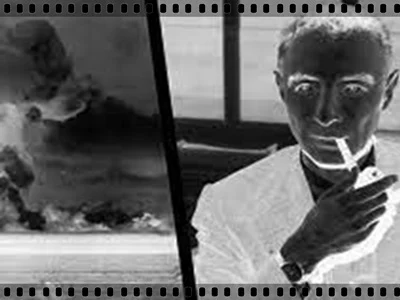J. Robert Oppenheimer, the renowned theoretical physicist, is widely known as the "father of the atomic bomb." His life and legacy have been the subject of much fascination and debate. In Christopher Nolan's new movie, "Oppenheimer," the audience is taken on a journey through Oppenheimer's life, exploring his contributions to science and the complex personal and political struggles he faced. This article delves into the true story behind the movie, shedding light on Oppenheimer's early life, his years in Europe, his ties to the Communist Party, his romantic relationships, the Manhattan Project, and the aftermath of his involvement in the development of the atomic bomb.
Oppenheimer's Early Life
J. Robert Oppenheimer was born in 1904 into a wealthy secular Jewish family in New York City. Although his parents were of German-Jewish descent, Oppenheimer refrained from embracing his heritage for much of his life. He was educated at Manhattan's Ethical Culture School, where he graduated in 1921. Throughout his time studying at Harvard, Oppenheimer faced antisemitism, which later influenced his engagement with his Jewishness. Despite his denial of his German-Jewish identity, it affected his relationship with the world and how he was perceived.
Years in Europe
After graduating from Harvard in 1925, Oppenheimer traveled to England to conduct research at the University of Cambridge's Cavendish Laboratory. His time in England was marked by struggles with mental health issues, and he ended up on probation. During this period, Oppenheimer allegedly relays a story about an act of jealousy involving lacing an apple with chemicals and leaving it on the desk of his tutor. He later transferred to the University of Gottingen in Germany, where he earned his Ph.D. in quantum physics. It was during his time in Germany that Oppenheimer studied with prominent physicists such as Max Born and Niels Bohr, alongside his future German counterpart, Werner Heisenberg.
Ties to the Communist Party
In 1929, Oppenheimer accepted a professorship at the University of California, Berkeley. Over the next 14 years, he established Berkeley as a leading institution for theoretical physics in the United States. During this time, Oppenheimer became interested in left-wing political causes and associated with members of the Communist Party, including his close friends and family members. While he never officially joined the Communist Party himself, his associations would later come under scrutiny and impact his career during the anti-Communist hysteria of the 1950s.
Romantic Relationships
Oppenheimer's personal life was marked by numerous romantic relationships. While he was in a tumultuous relationship with Jean Tatlock, a member of the Communist Party, he also entered into a marriage with biologist Kitty Puening. Despite his marriage, Oppenheimer maintained contact with Tatlock and visited her in San Francisco. Tragically, Tatlock's life ended in 1944 when she was found dead in her apartment. The circumstances surrounding her death raised suspicions due to her relationship with Oppenheimer and past involvement with communist politics. Despite rumors of other romantic entanglements, Oppenheimer remained married to Kitty until his death in 1967.
The Manhattan Project
In 1942, Oppenheimer was recruited for the Manhattan Project, a top-secret U.S. government initiative to develop an atomic bomb during World War II. He was appointed the scientific director of the project by General Leslie Groves. Oppenheimer assembled a team of brilliant scientists at the Los Alamos Laboratory in New Mexico, where they worked tirelessly to develop the bomb. The successful Trinity test in 1945 confirmed the bomb's effectiveness, and shortly after, atomic bombs were dropped on Hiroshima and Nagasaki, effectively ending the war. However, the devastation caused by the bombings and the ethical implications of the atomic bomb haunted Oppenheimer for the rest of his life.
Oppenheimer's Post-War Life
After the war, public opinion regarding the use of atomic bombs shifted, and Oppenheimer grappled with his role in their creation. Despite being hailed as a national hero, Oppenheimer expressed remorse and a sense of responsibility for the destructive power he had helped unleash. He became the chairman of the General Advisory Committee of the newly-formed Atomic Energy Commission (AEC) and opposed the development of the hydrogen bomb. He also became the director of the Institute for Advanced Studies at Princeton. However, his controversial stance on nuclear weapons and his past associations with the Communist Party made him a target during the political climate of the 1950s.
The AEC Hearing
In 1953, Oppenheimer's security clearance was revoked, and he faced a month-long security hearing. The hearing delved into his past communist associations, political beliefs, and personal transgressions, aiming to discredit him. Oppenheimer's controversial stance on nuclear weapons and his previous associations were used against him in what some saw as a biased and unjust proceeding. The result of the hearing had a lasting impact on Oppenheimer's reputation and career.
Later Life and Legacy
Despite the adversity he faced, Oppenheimer continued his work at the Institute for Advanced Studies until 1966. He received the Enrico Fermi Award in 1966, the highest honor bestowed by the AEC. In his acceptance speech, Oppenheimer reflected on the pursuit of science and the need to live without war as the great arbiter of history. He passed away in 1967, leaving behind a legacy of both scientific achievement and controversy.
Conclusion
J. Robert Oppenheimer's life was a complex tapestry of scientific brilliance, political struggles, and personal relationships. From his early years to his involvement in the Manhattan Project and the subsequent fallout, Oppenheimer's story continues to captivate and provoke thought. "Oppenheimer," the movie by Christopher Nolan, brings this fascinating story to the big screen, offering a glimpse into the mind of a man who shaped the world we live in today.



